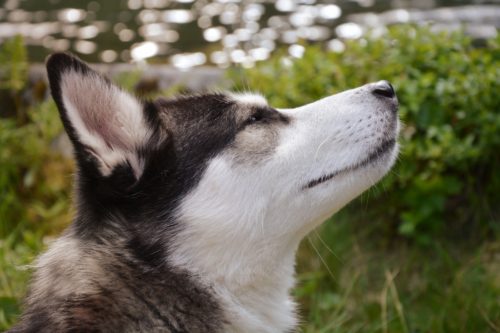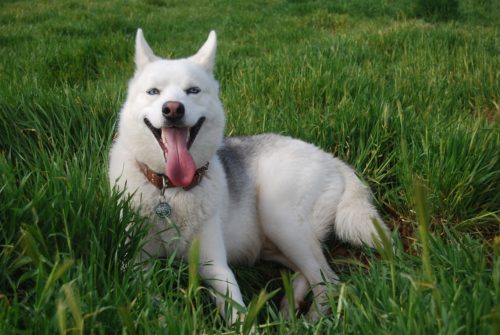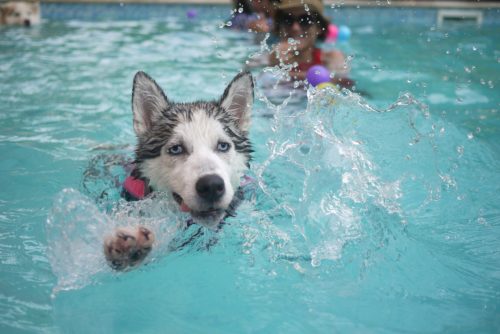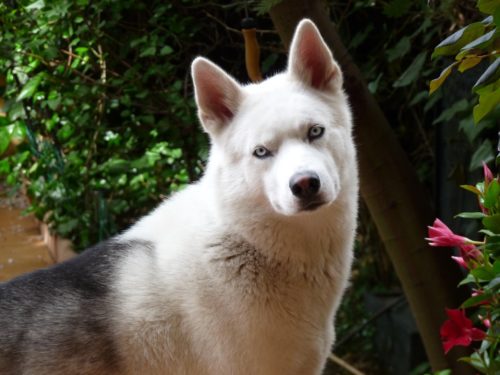The Siberian Husky breed has an average lifespan of 12 to 14 years and are an ideal pet choice for lots of different people, including families. However, purebred Huskies do have a number of canine health problems that prospective owners should consider.
As with all animals, it’s important to be aware of the common health concerns that plague Siberian Huskies since many of the problems can be expensive and time-consuming to treat. If you’re thinking of adopting a Husky, learn about their common health problems here so you can make an informed decision about the requirements of the dog breed.
Most Common Health Problems for Siberian Huskies
Siberian Huskies suffer from common health issues that most dogs are at risk for, like hip dysplasia and eye disease, but they are generally a relatively healthy breed of dog. Compared to other breeds, Huskies are known for their ability to maintain a healthy weight with less food but still require a high-protein diet. They are clean by nature and are typically free from odor and parasites on their body.

Since Siberian Huskies don’t require very much food, they are known for being ʺeasy keepersʺ. They are bred to pull a light load at a very fast pace across long distances in low temperatures on very little food.
Additionally, leaner dogs will typically live longer lives. If you’re considering adopting a Siberian Husky, it’s important to get to know the following specific health concerns within the breed.
Cataracts
One of the most common health problems for Siberian Huskies is cataracts, affecting about 10% of the breed. Cataracts in canines will typically develop within 6 to 12 months of a Husky’s life and can, unfortunately, lead to blindness later on. Because of this, it’s important to have your dog’s eyes checked by a vet on a regular basis.
Progressive Retinal Atrophy
Progressive retinal atrophy (PRA) in dogs is another common eye problem for Siberian Huskies. With PRA, the retina of a dog’s eye starts to deteriorate. Both cataracts and progressive retinal atrophy are considered to be costly health issues, so early detection is vital. This condition can also lead to canine blindness.
Corneal Dystrophy
Corneal dystrophy is a hereditary disease that affects the cornea of Siberian Huskies. If your Husky is suffering from this condition, you will notice small white dots in his cornea. Huskies with this health issue may experience opaqueness or at times, hazy vision. Sadly, there is currently no known treatment for correcting corneal dystrophy.
Uveodermatologic Syndrome
Uveodermatologic syndrome is another common eye disease with the Siberian Husky, although this condition also affects the skin as well as the nervous system. It’s important to keep in mind that the skin reaction to this syndrome is only cosmetic.

However, its effects on the eyes can cause blindness in severe cases.
Uveodermatologic syndrome is difficult to detect, but the first signs will usually be in a Husky’s eyes. Many dogs may show redness in their eyes as well as impaired vision.
Hip Dysplasia
One of the most concerning health issues for any dog owner to worry about is hip dysplasia, which is very common with Siberian Huskies.
This condition can lead to severe changes in the hip joint. Not only is it expensive to treat, it’s also quite painful for dogs affected by it. In many cases, both hips are impacted by dysplasia.
This leads to more pain for the dog as well as higher treatment costs. Unfortunately, there is no specific age when hip dysplasia appears in dogs. For some Huskies, the condition will crop up during middle age, but it can also present itself later in life.
Treatment for hip dysplasia in dogs typically involves surgery, but other options are also available. For example, weight management can help and will usually be recommended by a veterinarian in order to relieve some of the dog’s pain.
Follicular Dysplasia
Another common health problem seen in Siberian Huskies is follicular dysplasia. This condition affects Huskies between 3 and 4 months of age and can result in abnormal hair growth, canine hair loss, or patchy, infectious skin.
Siberian Huskies have a high risk of follicular dysplasia and unfortunately, there is currently no treatment. To better manage the disease, some vets will recommend that pet owners use specific shampoos, antimicrobials, and topical applications as needed.
Zinc Deficiency
Just like humans, dogs need a sufficient amount of zinc in their body in order to remain at optimum health. When Siberian Huskies experience a zinc deficiency, they might suffer from hair loss on their feet, elbows, or eye, chin, and lip areas. Zinc supplements may help alleviate symptoms, but a vet should be consulted before adding any to your pet’s diet to avoid an overdose.
Hypothyroidism
Hypothyroidism in dogs is a common health problem in Huskies that relates to an abnormal amount of secretion of the thyroid gland. If your Siberian Husky has this condition, you may notice that he’s gained weight, although he is eating less than normal. You might also notice fur loss or even bald spots located on his coat. Other symptoms include lethargy and increased sleep.
Keeping Your Husky Healthy
In order to keep your Siberian Husky healthy and prevent him from developing diseases and other health problems, it’s important to be mindful of proper nutrition, exercise requirements, and specific grooming needs.
Nutrition
You’ll want to feed your Siberian Husky a formula that will cater to his unique digestive needs through the various phases of his life. Several dog food companies have breed-specific formulas for puppies as well as middle-aged and senior dogs.

Choose high-quality dog food with natural ingredients. The quality of food and frequency you feed your dog will have a big impact on his longevity.
Additionally, be sure that clean water is available for your pet at all times.
Exercise
The predatory instincts of Siberian Huskies are strong, so they should be supervised in the presence of smaller dogs and other animals around the home.
Since they were bred to run all day long pulling a sled, they may run away if their leash is loose. Husky owners should be prepared with a fenced yard and use a leash every time they walk their dog. Additionally, this breed of dog should never be allowed unrestrained freedom. For their own protection, it’s best for Huskies to be confined in a home or fenced yard at all times unless they are exercising on a leash.
Because they’re such an active breed, Huskies require regular exercise. Their strong desire to run was endowed by their heritage. Sufficient exercise is necessary for the proper development of a Siberian Husky. They are adaptable animals and can live in any climate. However, it’s important to not to exercise this breed during the hottest part of the day.
Grooming
A Husky’s dense double-coat must be brushed at least once a week and brushed daily during the shedding season. Aside from brushing, a bathing your dog will keep him clean and in good hygiene.
Siberian Huskies have strong, fast-growing nails that should be trimmed regularly with a nail clipper. This will prevent overgrowth, splitting, and cracking. Also, a Husky’s ears should be checked regularly in order to avoid buildup of wax and debris which can result in a canine ear infection. Your dog’s teeth should also be brushed regularly.
Breeding
Good breeders utilize genetic testing of their stock in order to reduce the chance of disease in their puppies. Health problems for Siberian Huskies, including eye conditions, hip dysplasia, and hypothyroidism, are mainly genetic. Ask your Husky’s breeder about the medical history of the parents and grandparents and carefully consider whether to adopt a puppy if some of the common health conditions run in the family line.
You may also want to ask about breeder’s policy in cases of serious genetic diseases. A good breeder will request to be informed of this in order to make better breeding decisions in the future. Some breeders may also agree to contribute towards medical costs if a dog suffers from major health problems.
Instinct
The Siberian Husky is historically a long-distance sled dog. Because of their roots, Huskies have the instinct and drive to pull something and prefer to be in the lead when they go on walks with their owners. They are also natural hunters and will pursue small animals.

A Husky’s strength and exuberance allows them to jump over fences, dig their way out, and escape to chase another animal.
They love a cold climate and will be kept warm and dry by their thick coat in in all weather conditions.
New owners of Siberian Huskies should be prepared to provide an exercise outlet for their pet on a daily basis, whether this entails walks, runs, or a fenced yard to play around in.
As with many breeds of dogs, Huskies have a number of common health concerns that may cause them severe pain or a diminished quality of life. In order to prevent health problems and give your Husky the best life possible, make sure to keep them exercised and get them regularly checked by a vet.
Source : Canna-pet.com
